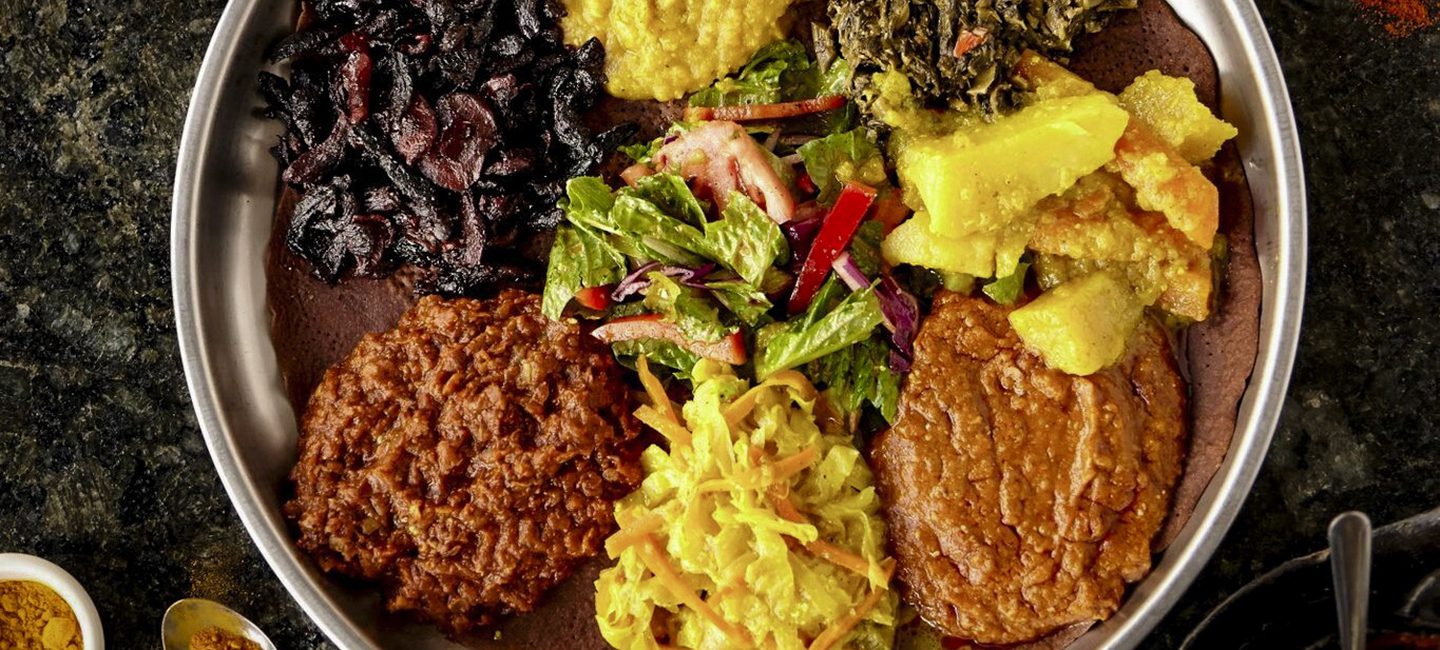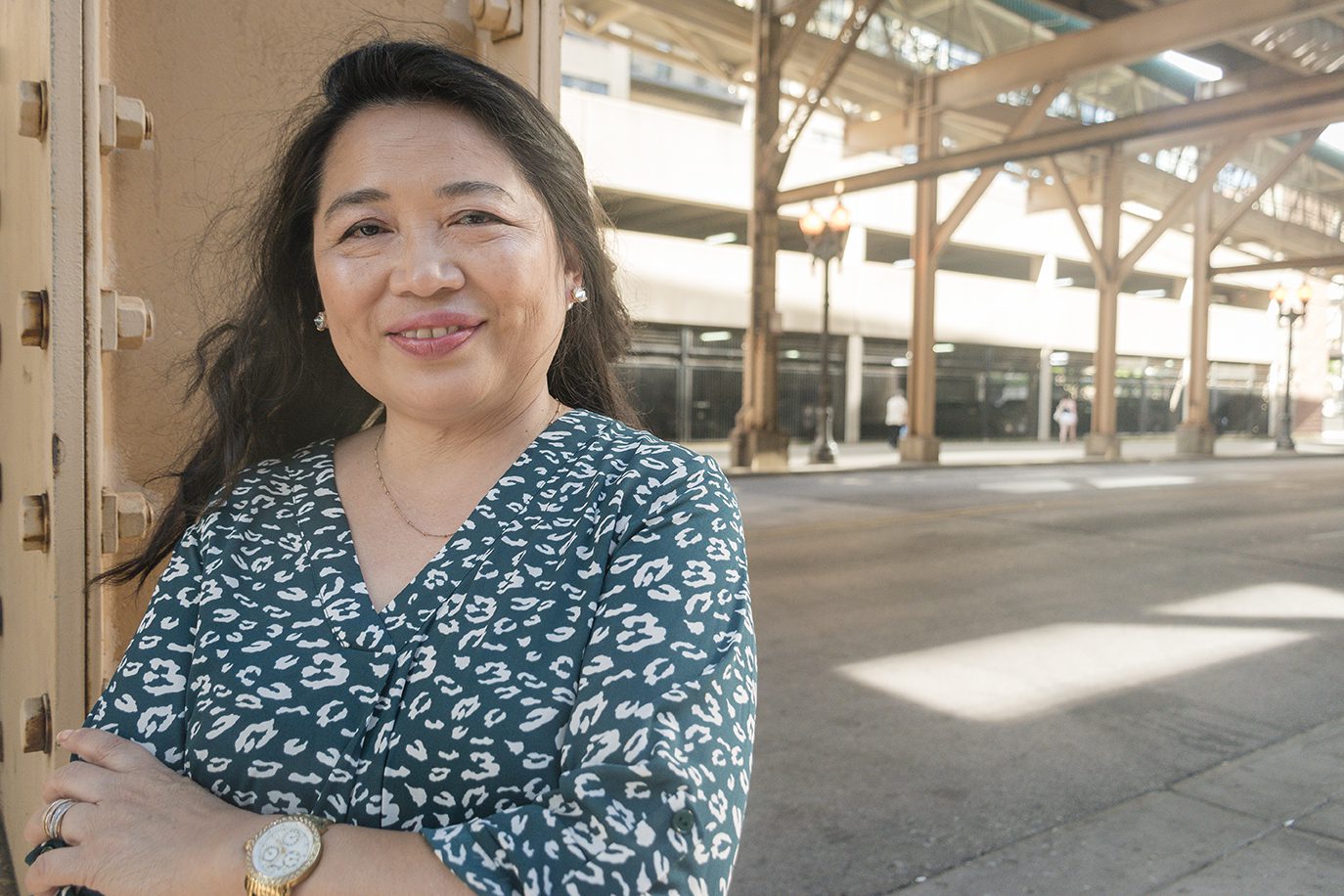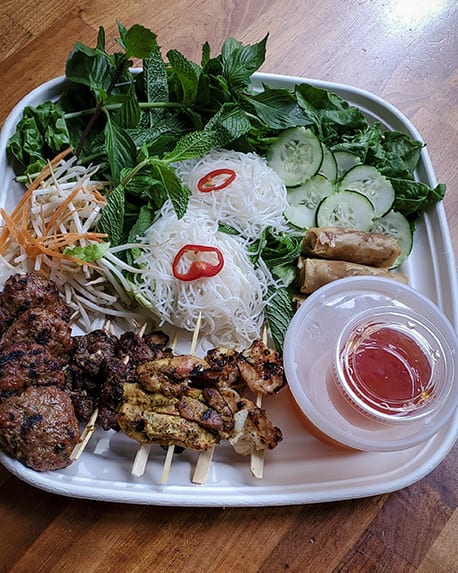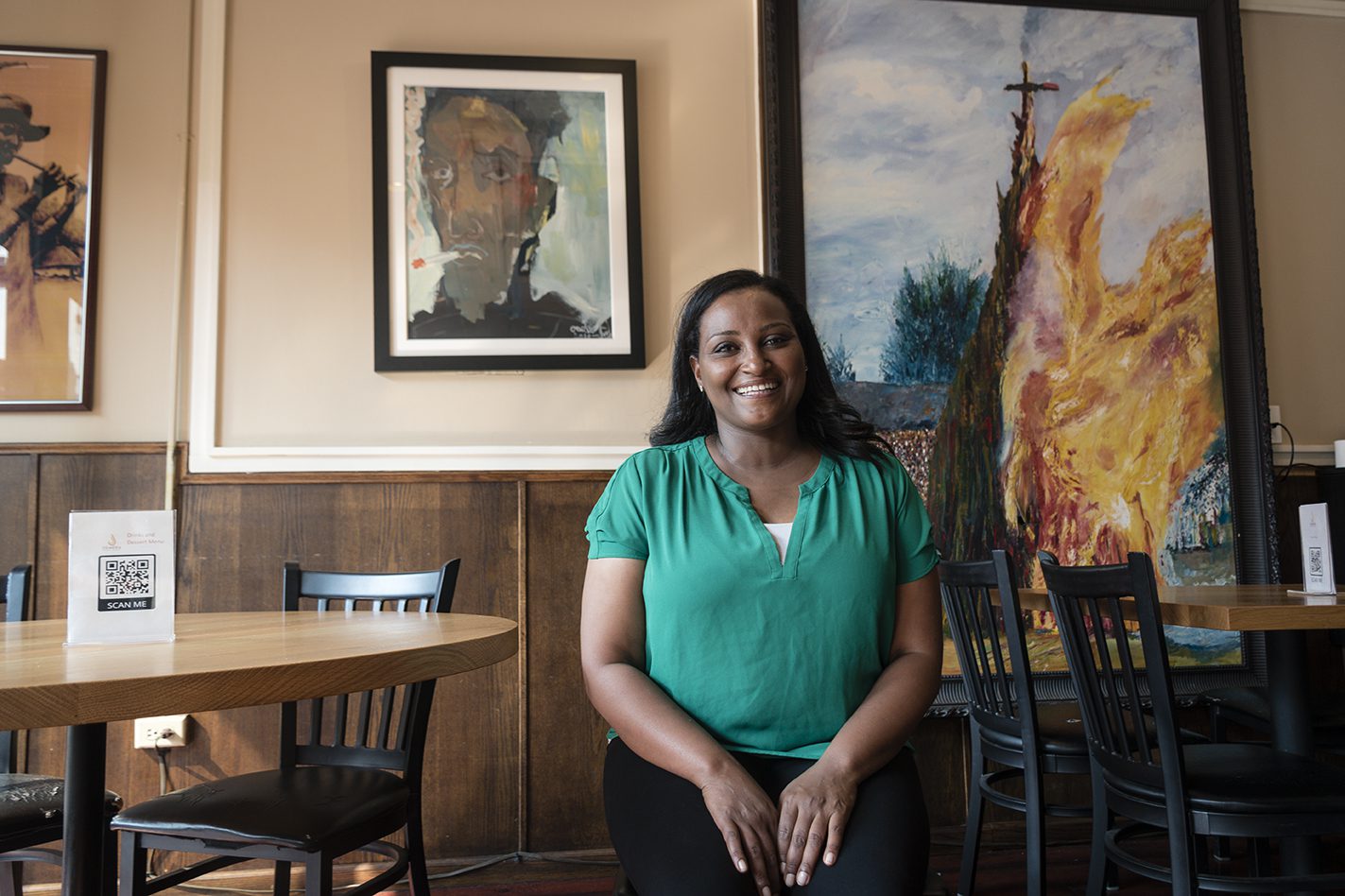 Foto cortesía de Demera
Foto cortesía de Demera Los restaurantes ofrecen paquetes gastronómicos "World Food Tour" con platos de las cocinas vietnamita y etíope.
Arriba: Plato de messob de Demera que se ofrece en el paquete de comida "World Food Tour". Foto cortesía de Demera
Mary Nguyen Aregoni es una superviviente. Cuando su familia llegó a Estados Unidos como refugiados tras huir de la violencia durante la guerra de Vietnam, Aregoni aprendió inglés para poder traducirlo todo para su familia. Escaló puestos en Procter and Gamble, pero quería ser empresaria, así que dejó su trabajo en 2009 para abrir un restaurante vietnamita llamado Saigon Sisters (567 W Lake St, Chicago, IL 60661). Cuando el COVID-19 golpeó Chicago y redujo sus ventas a más de la mitad, formó una nueva asociación con el restaurante etíope Demera (4801 N Broadway St, Chicago, IL 60640)un restaurante de la competencia.

La propietaria de Saigon Sisters, Mary Nguuyen Aregoni, en Chicago, Ill. 21 de agosto de 2020. Cassidy Jackson/Borderless Magazine
Hace cinco años conoció a Tigist Reda, propietaria de Demera, en un programa para pequeñas empresas de Goldman Sachs, y desde entonces se ayudan mutuamente.
"La colaboración es la única forma de sobrevivir", afirma Aregoni. "Ya no estamos en nuestras pequeñas islas".
Desde finales de mayo, Saigon Sisters y Demera intercambian comida y ofrecen paquetes de comida "World Food Tour". En ambos restaurantes, los clientes pueden pedir y recoger por adelantado un plato etíope, uno vietnamita o una combinación de ambos.

Ensalada vietnamita de lujo de Saigon Sisters con rollitos de huevo vegetales y fideos de arroz, que se ofrece en el paquete de comida "World Food Tour". Foto cortesía de Saigon Sisters
Para uno de los paquetes, Reda eligió uno de los platos estrella de su cocina: messobque es una fuente de pequeños platos que incluyen carne, pescado y verduras junto con injera. Mientras tanto, Saigon Sisters ofrece una ensalada vietnamita de lujo con rollitos de huevo vegetales y fideos de arroz.
Para dar a conocer la asociación, Reda y Aregoni enviaron un boletín a sus clientes. Los medios de comunicación de Chicago cubrieron el lanzamiento y Aregoni incluso recibió una llamada de su familia de Vietnam, que la había visto en la televisión local. Hasta ahora han vendido unas 100 comidas del World Food Tour. En el primer mes de la promoción, las ventas de Saigon Sisters aumentaron un 25%.
La asociación "World Food Tour" está resultando lucrativa, ya que ambos restaurantes luchan por sobrevivir a la pandemia. Debido a COVID-19, Reda tuvo que despedir a 27 empleados. Durante los meses previos a la colaboración, su plantilla se redujo a dos gerentes y Reda. El despido de empleados fue uno de los puntos más bajos para ella durante la pandemia.
"Cuando cerramos, todo el mundo llamaba, enviaba correos diciendo: '¿Estáis bien?". dice Reda. "Dieron propinas muy generosas a los miembros del personal cuando cerramos, [ya que] guardábamos las propinas para la gente que no estaba trabajando. La gente daba propinas extra y donaba a nuestro GoFundMe. Así que es increíble ver cómo se presentó la gente".
Cada mes, Demera ha podido repartir unos $4.000 en propinas y GoFundMe donaciones entre el personal desempleado de los restaurantes. Pero el dinero nunca se reparte equitativamente.
"Enviamos un mensaje [a nuestros empleados] diciendo: 'Eh, esto es lo que tenemos. Por favor, díganos quién lo necesita'", dijo Reda. "La gente venía y decía: 'Eh, estoy bien. Dáselo a otro'. La gente que más lo necesitaba recibía el dinero en vez de repartirlo a partes iguales entre todos".
Gracias a la ayuda de clientes y empleados, Reda pudo reincorporar al 80% del personal de cocina de Demera en junio. Aregoni también tuvo que despedir a algunos trabajadores a tiempo parcial, pero ha podido mantener a la mayoría de sus empleados clave.

Tigist Reda, propietario de Demera, el 27 de agosto de 2020 en Chicago, Illinois. Cassidy Jackson/Borderless Magazine
Entre los tres locales de Saigon Sisters, Aregoni ha tenido que cambiar de enfoque. A finales de marzo cerró su puesto en el Mercado Francés de Chicago debido a las restricciones para comer en el interior. A principios de agosto, el puesto volvió a abrir, pero con horario reducido. A falta de espacio para comer al aire libre, el local principal de Aregoni se centra ahora en el servicio a domicilio y los pedidos para llevar. El tercer local de Saigon Sisters, en el Northwestern Memorial Hospital, no ha cerrado nunca y atendía a los trabajadores esenciales.
Aregoni afirma que el apoyo emocional que ha recibido de Reda ha ayudado a ambas a superar estos duros momentos. Durante la pandemia han intercambiado notas sobre sus solicitudes de préstamos para pequeñas empresas y se han ayudado mutuamente a aumentar su clientela ofreciéndose consejos sobre marketing por correo electrónico y redes sociales.
Reda y Aregoni Esperamos que el éxito de su asociación inspire a otros empresarios, especialmente mujeres, a apoyarse mutuamente, tanto emocionalmente como a través de asociaciones rentables, durante esta pandemia.
 Esta historia forma parte del Soluciones para Chicago esfuerzo de colaboración de las redacciones para cubrir a los trabajadores considerados "esenciales" durante COVID-19 y cómo la pandemia está reconfigurando el trabajo y el empleo.
Esta historia forma parte del Soluciones para Chicago esfuerzo de colaboración de las redacciones para cubrir a los trabajadores considerados "esenciales" durante COVID-19 y cómo la pandemia está reconfigurando el trabajo y el empleo.
Es un proyecto de la Local Media Foundation con el apoyo de la Google News Initiative y la Solutions Journalism Network. Entre los 19 socios se encuentran WBEZ, WTTW, Chicago Reader, Chicago Defender, La Raza, Shaw Media, Block Club Chicago, Borderless Magazine, South Side Weekly, Injustice Watch, Austin Weekly News, Wednesday Journal, Forest Park Review, Riverside Brookfield Landmark, Windy City Times, Hyde Park Herald, Inside Publications, Loop North News y Chicago Music Guide.
